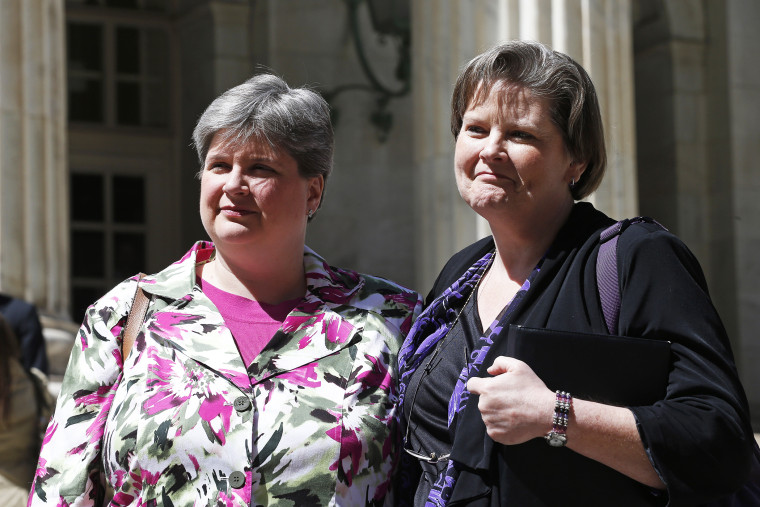Friday was a mixed bag for marriage equality in the 10th Circuit.
Shortly after the Denver-based appeals court ruled against Oklahoma’s ban on same-sex nuptials, both the U.S. Supreme Court and the Colorado Supreme Court decided to rain on the parade.
In Colorado, the state’s highest court told clerks they could no longer issue marriage licenses to gay and lesbian couples. The decision comes one week after a district judge said it was OK for the Boulder County Clerk to ignore the state’s same-sex marriage ban, which was technically still in place.
A federal judge in Colorado, and the 10th Circuit Court of Appeals -- which has jurisdiction over Colorado -- had recently ruled against banning same-sex nuptials. But both decisions were put on hold, meaning that the ban still had to be respected. After more clerks in Colorado began issuing marriage licenses to gay and lesbian couples, the state’s Supreme Court on Friday ordered them to stop. The appeal was brought by Republican Attorney General John Suthers, who is defending the state’s ban.
In a marriage equality case from Utah, which is also in the 10th Circuit, the U.S. Supreme Court on Friday delayed state recognition of the more than 1,000 same-sex marriages that took place last year. Hundreds of gay and lesbian couples were able to wed in the Beehive State after a federal judge struck down its ban on such unions last December. Weeks later, the nation’s highest court stopped any more same-sex marriages from taking place in the state for the duration of the appeals process.
Two months ago, a federal court ordered Utah to recognize the same-sex marriages performed during the brief period when they were allowed. But Utah officials appealed, asking for a stay. On Friday, the U.S. Supreme Court obliged, meaning that gay and lesbian couples married in Utah would have to wait to receive state spousal benefits.
"I know these things take time, but every day there's a degree of anxiety about our family and our situation with our son," Matthew Barraza, whose husband is not recognized as their child’s legal parent, told the Associated Press. "We just want all the protections that come along with marriage, for our family to be treated fairly like anyone else."
The developments in Utah and Colorado followed much happier news regarding a different 10th Circuit state: Oklahoma. In a 2-1 decision Friday, a three-judge panel of the 10th Circuit ruled that gay and lesbian couples had a “fundamental right” to marry and to have their marriages recognized in the Sooner State. The decision upholds a lower court’s ruling, which declared Oklahoma’s decade-old marriage amendment unconstitutional, and follows a similar ruling that invalidated Utah’s ban.
It was the latest in an unbroken string of victories for supporters of same-sex marriage. Since the Supreme Court decimated the federal Defense of Marriage Act (DOMA) last year, no argument for marriage equality has ever lost in federal court.
Utah’s Republican Attorney General Sean Reyes announced last week he would be appealing the 10th Circuit’s decision to the U.S. Supreme Court, though there’s no guarantee the justices will agree to hear the case. Oklahoma officials are sure to appeal Friday’s decision as well.
Both the Oklahoma and Utah rulings are on hold pending appeals, meaning gay and lesbian couples are still barred from marrying in the deep-red states. Still, marriage equality advocates are encouraged by the tremendous momentum on their side.
“Today’s victory brings us ever closer to the day when all committed and loving gay and lesbian couples have the right to marry the person they love, regardless of what state they call home,” said Human Rights Campaign President Chad Griffin in a statement. “There’s no question that the U.S. Supreme Court must take up the issue to decide once and for all whether or not states can continue to treat committed and loving gay and lesbian couples as second class citizens.”
The Oklahoma case was brought by two couples – Mary Bishop and Sharon Baldwin, and Gay Phillips and Susan Barton – who challenged the state’s 2004 voter-approved amendment defining marriage as between one man and one woman.
This story was updated at 7:53 p.m. to reflect the latest news out of the 10th Circuit.
